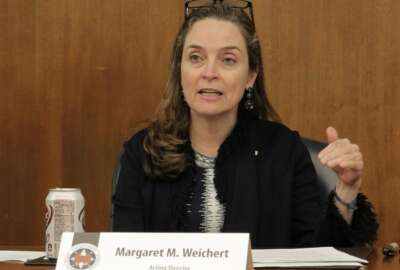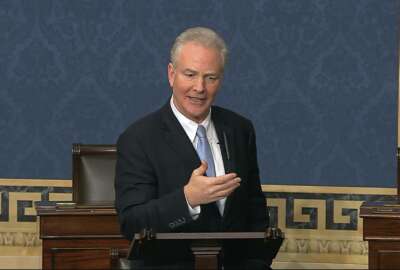
Congress calls for workforce safety plans for agencies, reskilling oversight and more
As pandemic guidelines change, the House Oversight and Reform Committee advanced legislation that would require specific workplace safety plans from federal...
With states lifting pandemic restrictions and guidance from the Centers for Disease Control and Prevention changing rapidly, Congress wants federal agencies to start making plans for safely reopening their offices to more employees.
The Chai Suthammanont Remembrance Act, which Rep. Gerry Connolly (D-Va.) reintroduced this year, requires agencies to develop and publish pandemic safety plans within two months of the bill’s passage.
Plans must explain how agencies will prevent the spread of COVID-19 within their workplaces and what personal protective equipment they will make available to employees and contractors, as well as their cleaning, testing, contact tracing and vaccine procedures.
Specifically, the bill calls on agencies to weigh in on telework arrangements — and whether employees must be vaccinated in order to be physically present at the workplace.
The Safer Federal Workforce Task Force, which the Biden administration created on its first day in office, has already suggested agencies grant leave to employees to receive the vaccine and recover from any adverse reactions.
Connolly named the bill after one of his constituents, a federal employee who worked at a child care facility at Quantico Marine Base in Virginia. Suthammanont died last year from complications due to COVID-19, and Connolly said more stringent safety protocols at his agency and others may have prevented his death.
The Oversight and Reform Committee advanced the bill on Thursday to the House floor, but not without some debate.
The committee briefly considered an amendment that would have required agencies to bring all federal employees back to work in person within 60 days of the bill’s passage.
“That language also — again, I don’t believe it’s intended — could clearly be construed as eliminating telework,” Connolly said. “We want telework with or without a pandemic. This committee has been promoting telework for years.”
Rep. Jody Hice (R-Ga.) said he’s received calls from his constituents who are struggling to get responses from federal agencies. Their complaints prompted him to introduce the amendment, which the committee voted down along party lines.
“We need some sort of date. Let’s shoot for something to be back to work,” he said.
The House already passed a version of Connolly’s bill last year, but the Senate never considered it. Multiple federal employee unions and organizations support the legislation.
“We don’t know when agencies will fully reopen all of their buildings, but it is certainly not too early to plan for employees’ safe return,” Tony Reardon, national president of the National Treasury Employees Union, said earlier this week. “At NTEU, we are urging agencies to maintain expansive telework policies and flexible scheduling to keep offices from being crowded, improve ventilation and air filtering systems, establish a transparent process for notifying employees when a coworker or contractor tests positive for COVID-19 and to maintain stringent cleaning and disinfecting protocols.”
Oversight over federal reskilling efforts, and a Tik Tok ban
A few senators are calling on the Office of Personnel Management to implement and oversee more guardrails around federal reskilling programs.
Sens. Kyrsten Sinema (D-Ariz.) and James Lankford (D-Okla.) are the lead cosponsors of the Facilitating Federal Employee Reskilling Act, which directs OPM to certify whether programs meet certain parameters.
Reskilling programs should, for example, ensure employees who are transferred to new positions actually utilize the skills they received training for, the legislation said. Employees should also have a chance to move back to their old job if they’re not successful in the new position.
And perhaps most notably, the bill would ensure employees who complete a reskilling program and transfer to a new position based on their training take on jobs at the same grade level as their prior position.
Agencies may struggle to implement that last requirement. The Trump administration, which launched several reskilling programs during its tenure, found it difficult to secure new jobs at the same or higher grade level for the students who had successfully completed the Federal Cybersecurity Reskilling Academy.
The Senate Homeland Security and Governmental Affairs Committee advanced Sinema and Lankford’s bill by a voice vote earlier this week.
The same Senate committee also advanced a separate bill, which bans federal employees from downloading or using Tik Tok on government devices. Sens. Josh Hawley (R-Mo.), Tom Cotton (R-Ark.), Marco Rubio and Rick Scott (R-Fla.) are all cosponsors.
Another attempt at pay parity for wage grade employees
Finally, a small group of Senate and House members are taking another stab at pay parity for federal wage grade employees.
General Schedule employees receive locality pay adjustments, which are determined by a complicated set of metropolitan market assessments that are updated on occasion.
But most of the local boundaries for employees paid under the wage grade system were based on military installation locations and haven’t been updated in decades.
Sen. Bob Casey (D-Pa.) and Rep. Matt Cartwright have reintroduced legislation that would limit the number of wage grade areas within a locality pay region, potentially raising pay for hourly federal workers.
“Currently, salaried and hourly federal employees can work side-by-side in the exact same location yet be treated as though they work in different locations when it comes to determining their locality pay,” Everett Kelley, national president of the American Federation of Government Employees, said in a statement this week. “Federal employees in the skilled trades commute along the same routes and face the same living costs as their salaried coworkers, and there is no rational reason why the government pretends they are in different locations once they arrive at work.”
Democrats Sherrod Brown (Ohio), Elizabeth Warren (Mass.) and Chris Murphy (Conn.) are cosponsors of the Senate bill.
Copyright © 2025 Federal News Network. All rights reserved. This website is not intended for users located within the European Economic Area.
Nicole Ogrysko is a reporter for Federal News Network focusing on the federal workforce and federal pay and benefits.
Follow @nogryskoWFED
Related Stories





